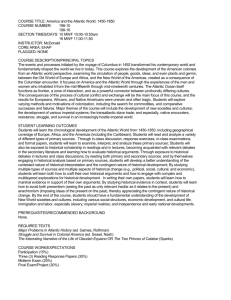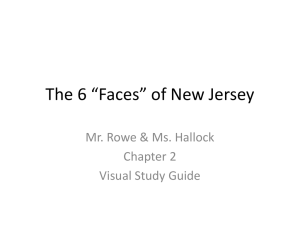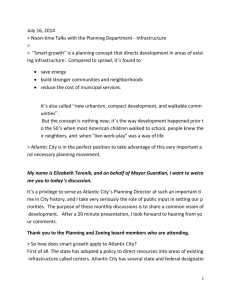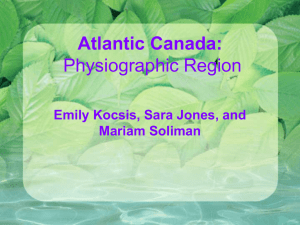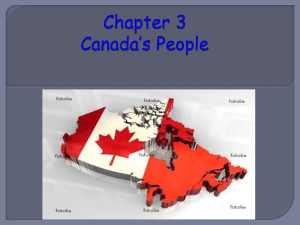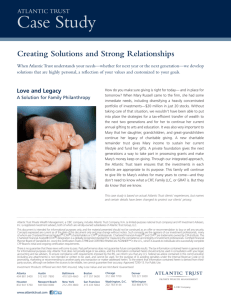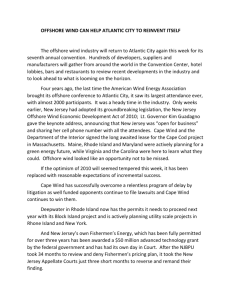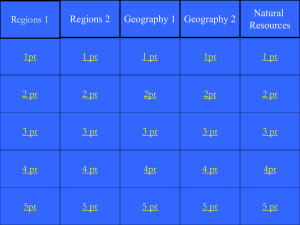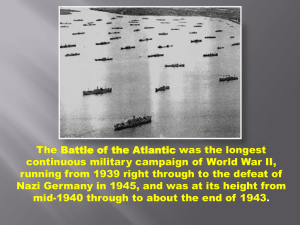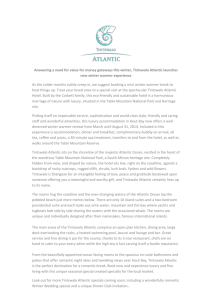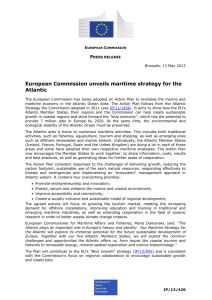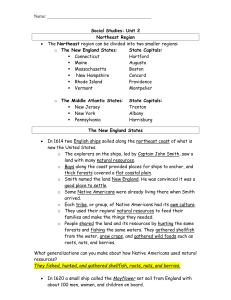2011 Science Introduction - Atlantic County Special Services
advertisement
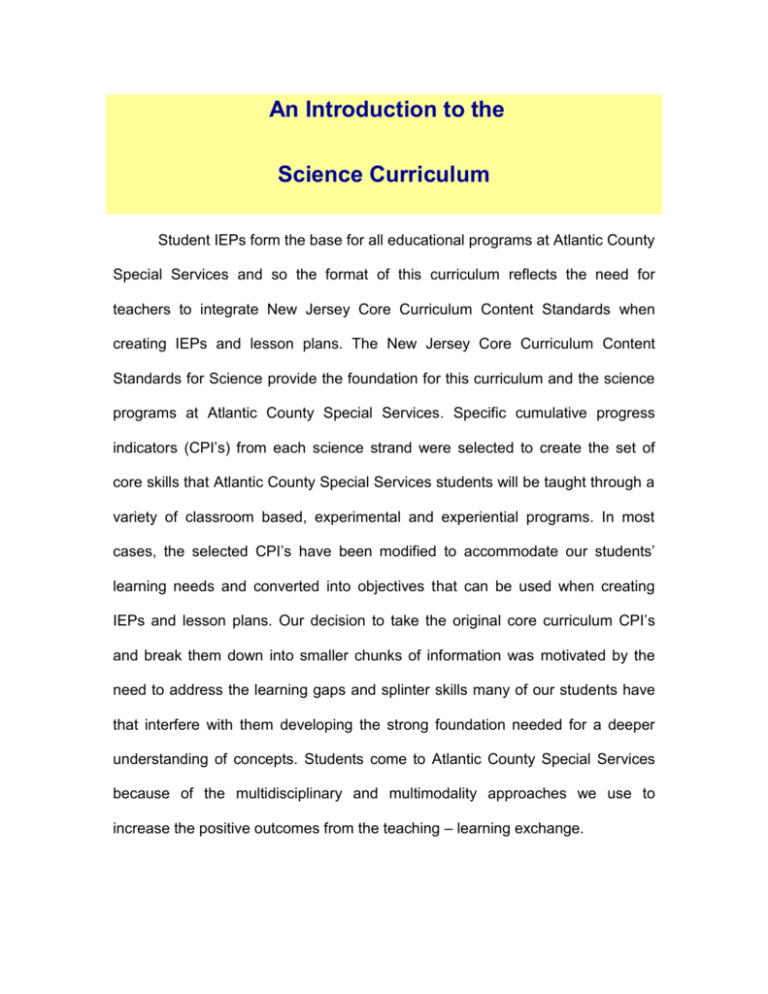
An Introduction to the Science Curriculum Student IEPs form the base for all educational programs at Atlantic County Special Services and so the format of this curriculum reflects the need for teachers to integrate New Jersey Core Curriculum Content Standards when creating IEPs and lesson plans. The New Jersey Core Curriculum Content Standards for Science provide the foundation for this curriculum and the science programs at Atlantic County Special Services. Specific cumulative progress indicators (CPI’s) from each science strand were selected to create the set of core skills that Atlantic County Special Services students will be taught through a variety of classroom based, experimental and experiential programs. In most cases, the selected CPI’s have been modified to accommodate our students’ learning needs and converted into objectives that can be used when creating IEPs and lesson plans. Our decision to take the original core curriculum CPI’s and break them down into smaller chunks of information was motivated by the need to address the learning gaps and splinter skills many of our students have that interfere with them developing the strong foundation needed for a deeper understanding of concepts. Students come to Atlantic County Special Services because of the multidisciplinary and multimodality approaches we use to increase the positive outcomes from the teaching – learning exchange. The Science Program at Atlantic County Special Services is built on the belief that all students can and should possess the fundamental scientific knowledge and skills necessary to become successful, literate and contributing citizens in the technological world of the 21st century. We therefore expect, that to the fullest extent possible, our students will demonstrate the understanding and critical thinking skills necessary to apply scientific concepts in an increasingly complex and changing world. Our science program strives to include topics from the following areas: scientific practices, physical science, life science, and earth science systems. The staff at Atlantic County Special Services recognizes the need for all students to have a basic understanding of scientific concepts so they can make informed decisions when faced with personal, civic, cultural and economic problems. Therefore every effort is made to show students how important the natural world is to their daily lives by infusing scientific principles into lessons, highlighting its applications throughout their day, and calling attention to adults who are using science to solve every day problems. Due to our student’s unique, varied and multiple needs instruction at Atlantic County Special Services is designed to build upon student strengths, minimize the educational impact of weaknesses and readily connect classroom learning to lived experiences. The necessary accommodations, modifications, and support are provided to insure that all students, regardless of their abilities, have the opportunity to develop science related skills. Activities and materials are adapted to maximize active student participation in the learning and allow them to clearly demonstrate the knowledge/skills they have acquired. Various lesson formats are used including one to one, peer partners, small group, large group, field trips and work sites to encourage curiosity, maximize learning potential and accommodate student needs. The Atlantic County Special Services School District science program is inquiry based and includes opportunities for students to listen, observe, conduct experiments, collect data/evidence, and explore multiple information sources so they can construct answers and develop solutions to scientific problems. Science lessons can be highly structured, workplace based or anything in between depending on student need and skill level. All lessons begin with the student’s current level of functioning in mind and are designed to be multi sensory and engaging in an effort to move the student closer to proficiency. Occupational, Physical and Speech Therapists are a valuable asset when students require adaptive equipment, materials and strategies to participate fully and gain maximum benefit from instructional experiences. Teachers use pictures and manipulatives when necessary to increase the level of student understanding for concepts being taught. Students learn how to apply various scientific concepts and strategies through hands – on discovery and problem based learning experiences. Science lessons are designed to develop fundamental knowledge and skills in all the Core Content areas while at the same time fostering strong critical thinking skills. Activities and materials are used that will promote a deep understanding of the scientific practices while also developing the habits of mind that will create curious, open-minded, honest and safe adults. Rather than practice skills through rote, repetitive exercises students are given the opportunity to work together in cooperative groups where knowledge, ideas, and strategies can be discussed, debated and applied to new problems. Our school is set within a wild and natural area making it possible to give students the opportunity throughout the school year to see and use scientific principles in various settings and contexts thus deepening and expanding their knowledge and skills. Whenever possible science skills are developed and reinforced throughout all content areas of instruction. Students are encouraged to be conscientious and active partners in the teaching – learning exchange. Science lessons are designed to be positive, enjoyable, and successful experiences for all students regardless of ability and/or interest levels. Incentives and behavioral management techniques are used extensively to enhance the learning environment and increase levels of student motivation. Therapists and counselors work closely with instructional staff to insure that all student learning is connected and relevant to the development of proficiency in the New Jersey Core Curriculum Content Standards. In addition to the mandated Statewide Testing Program teachers at Atlantic County Special Services conduct ongoing and varied evaluations of student progress. Student growth is measured on a daily basis using both formative and summative assessment techniques including many authentic strategies. All assessment is designed to improve the teaching – learning exchange and includes everything from daily observations and checklists to the use of rubrics to evaluate projects, tests/exams designed to gauge mastery of unit concepts and teacher interviews to evaluate what techniques students use and how they apply those techniques in various situations. Teachers, therapists and instructional support personnel provide the support and feedback necessary to keep students engaged in lessons, positive about their abilities and moving toward proficiency. Whenever necessary lessons are reviewed and/or modified to address individual learning needs and promote mastery of a particular concept or skill. The assessment techniques and expected outcomes are individualized based on a student’s skill level, rate of learning, and long-term goals. References New Jersey Department of Education (2009). New Jersey Core Curriculum Content Standards For Science.
